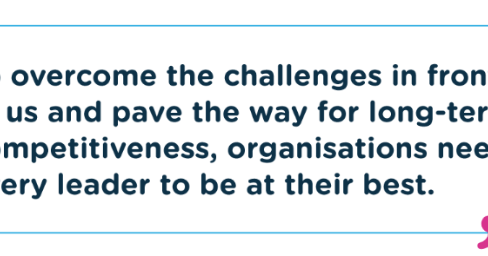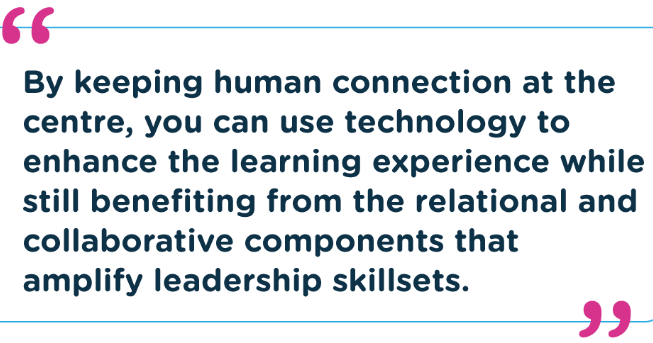Defining the Future of Leadership Development

The recent season of volatility has changed the shape of the world and economy in a way that the current generation of leadership is likely to never have experienced, and as we adjust to the realities of this new environment, it’s becoming clear the role of leaders is now more demanding than ever.

To overcome the challenges in front of us and pave the way for long-term competitiveness, organisations need every leader to be at their best. Doubling down on leadership development amid market shifts, budget constraints and ongoing uncertainty can seem ambitious, but it’s also an opportunity to shape the future of how we support and upskill those at the front to maximise bottom-line results.
As you re-examine the way you approach leadership development within your organisation, keep the following considerations in mind.
Clear and Consistent Objectives
It’s important to be clear about the core objectives of any leadership development initiative, particularly during times when budgets are impacted and performance is critical.
Consider what practices, skillsets and behaviours you want to increase in your leadership team, as well as the metrics that need enhancing, and ensure these remain a consistent focus across all learning and development activities. When looking at individual skills, whether they be problem-solving, emotional intelligence or change management, reflect on how they align with the foundational goals you’re trying to achieve.
Each of these competencies should form part of a catalogue of skills that are affixed to the organisation’s core leadership objectives, which must be continuously set, reviewed and critiqued to ensure they serve both the needs of the present and the future.
Leveraging Technology
In recent months, we have seen digital adoption accelerate exponentially, but the way we handle this increased focus on technology in the framework of leadership development is crucial to its effectiveness. Used well, digital tools can enrich the way we grow leaders, but the risk comes when we see technology as a temporary fix for a short-term problem – or worse, simply transplant existing approaches into virtual platforms.
Rather than just delivering theory over Zoom or moving to an online course, the best strategy is to build a leadership development experience around the unique benefits of the technology, without losing sight of the ultimate behaviour change and leadership performance outcomes.
Reviving Human Connection
While technology will definitely play a key role in the future of leadership development, human connection will remain vital as people continue to seek out opportunities to learn face-to-face, particularly once all social distancing recommendations cease. Instead of moving to a model based solely on online, in-demand learning, it will be important to identify ways to leverage technology without displacing the social element.

For example, an immersive, interactive and personalised digital learning experience interspersed with regular online discussions and practical in-person workshops is likely to be a lot more effective than a library of dense instructional videos. Organisations will obviously need to tailor this to what is realistic for them, but by keeping human connection at the centre, you can effectively use technology to enhance the learning experience while still benefiting from the relational and collaborative components that amplify leadership skillsets.
Unique Contexts, Common Foundation
It’s important to remember that leadership development is not one-size-fits-all, especially in this dynamic market. The practice of leadership changes constantly and depends largely on its environment – a manager of a small team, for instance, deals with very different intricacies to a C-suite executive.
Consequently, effective leadership development programs are responsive to the unique contexts of how people lead at various levels of the business, providing each individual with the relevant skills they need to maximise their impact. At the same time, everyone in the business (regardless of where they sit) should be guided by a common set of leadership concepts, which is why it’s also important to create a shared language that everyone can understand to set the groundwork for a culture of exceptional leadership.
Summary
Having strong leaders that are equipped for the future has never been more important. The good news is that budgets don’t have to impact the development quality – by being open to new strategies and solutions, prioritising current and future needs and creating a shared foundation, you can give leaders the support they require to continue carrying your organisation forward.
If you need specialist IT & Digital recruitment support in Sydney or Brisbane, speak to the team at Talenza today. We can provide a tailored end-to-end Executive Search solution to secure the leaders your organisation needs or help you find the opportunity that will take your career to the next level.